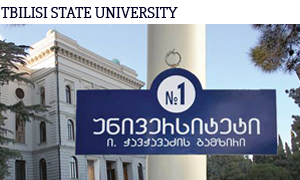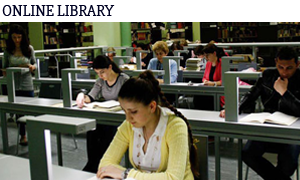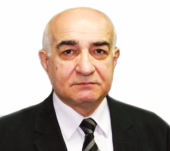
FACULTY OF SOCIAL AND POLITICAL SCIENCES
SECURITY STUDIES AT TSU
After the collapse of the Soviet Union, many reports were published worldwide on issues of transition from totalitarianism to democracy. However, in the second half of the 1990s, along with democratization, corruption and organized crime increased, and in Georgia these began to threaten the security of the country at all levels. Political scientists evoked the specter of a “failed state”. In 2002 a research program was launched with an initial focus on problems of corruption and organized crime, and in 2003 anti-corruption and anti-criminal reforms in Georgia began.
 Several projects have been implemented at Tbilisi State University under the guidance of Professor of Political Science, Alexandre Kukhianidze, in the Faculty of Social and Political Sciences. With support from the U.S. Department of Justice, research on “Smuggling through Abkhazia and theTskhinvali Regions of Georgia” was carried out in 2003-2009. Another study was carried out simultaneously, “Smuggling in Radiological and Nuclear Materials via Georgia” with support from the U.S. Department of Energy. Both projects were implemented in collaboration with the Terrorism, Transnational Crime and Corruption Center (TraCCC) at George Mason University, where Professor Louise Shelley is Director.
Several projects have been implemented at Tbilisi State University under the guidance of Professor of Political Science, Alexandre Kukhianidze, in the Faculty of Social and Political Sciences. With support from the U.S. Department of Justice, research on “Smuggling through Abkhazia and theTskhinvali Regions of Georgia” was carried out in 2003-2009. Another study was carried out simultaneously, “Smuggling in Radiological and Nuclear Materials via Georgia” with support from the U.S. Department of Energy. Both projects were implemented in collaboration with the Terrorism, Transnational Crime and Corruption Center (TraCCC) at George Mason University, where Professor Louise Shelley is Director.
Key findings ascertained that organized crime and corruption are integral parts of national security problems, but also that armed conflicts in Abkhazia and the Tskhinvali Region, and Russia’s position towards Georgia are all elements of transnational crime and represent a component of global security. Therefore, following the 2008 Russia-Georgia war, Alexandre Kukhianidze’s research interests covered several new security concepts.
Security issues have significantly increased after the Cold War. A research project on “Theorizing Non-Traditional Threats and Challenges for National Security” was implemented in 2010-11 and financed by the Carnegie Endowment at the Monterey Institute of International Studies in collaboration with William C. Potter, Director of the James Martin Center for Nonproliferation Studies at the Monterey Institute of International Studies.
Following the Warsaw Pact and collapse of the Soviet Union, with the end of the Cold War, all fears and threats about a Nuclear Armageddon faded, but old approaches to security guarantees began to change. Rapid globalization paved the way for new threats such as nuclear smuggling, transnational organized crime, cybercrime, organ trafficking, money laundering, and others. Publications about new threats began to appear in the 1980s, and since the 1990s the treacherous results of “non-traditional” threats were becoming painfully evident. Traditionally, security studies had been discussed in connection with the nation state, considered the key provider of security. Civil society had been seen as a passive object or was deemed insignificant, along with business and local government bodies. Traditional security concentrated on geopolitics, military force, and the foreign policy of nation states. In the 1990s, western political literature began to revise traditional security approaches, however, as developed and developing countries alike realized that non-traditional threats include economic growth problems, poverty and development rather than only military blocs and balancing superpowers.
These concepts largely determined the expansion of national security in two directions: first, analyzing the interrelation between global, regional and local problems; and second, focusing on relations between civil groups and peoples. Theoretically, the broadening of the security concept has increased the complexity of understanding what modern national security is and what priorities it has in the post-Cold War era.
 Security studies were traditionally found within disciplines such as international relations. Today, however, not all threats can be covered by this discipline and “security” is not subject to a simple definition anymore. Different, multidisciplinary approaches are needed to analyze natural calamities, corruption, technogenic hazards and organized crime. Political science also plays a strong role here. “New” and “non-traditional” studies in the field of security have many shortcomings. What is “new” and “non-traditional” today will be “old” and “traditional” tomorrow, for example cybercrime. Similar terms can characterize the essence of modern security studies only temporarily. Indeed, modern national security envisages shifting the emphasis from military to civil security. Along with the state, it also engages civil society organizations as security providers and includes certain types of fighting against organized crime and corruption. Today, the struggle against organized crime and corruption includes civil society and security priorities are constantly changing along with shifting sources of threats.
Security studies were traditionally found within disciplines such as international relations. Today, however, not all threats can be covered by this discipline and “security” is not subject to a simple definition anymore. Different, multidisciplinary approaches are needed to analyze natural calamities, corruption, technogenic hazards and organized crime. Political science also plays a strong role here. “New” and “non-traditional” studies in the field of security have many shortcomings. What is “new” and “non-traditional” today will be “old” and “traditional” tomorrow, for example cybercrime. Similar terms can characterize the essence of modern security studies only temporarily. Indeed, modern national security envisages shifting the emphasis from military to civil security. Along with the state, it also engages civil society organizations as security providers and includes certain types of fighting against organized crime and corruption. Today, the struggle against organized crime and corruption includes civil society and security priorities are constantly changing along with shifting sources of threats.
Now organized crime represents one of the main threats to national and international economic security; its impact on the international financial network and national economies has grown, and connections between the perpetrators are increasing. The fact that criminals can find shelter in foreign countries and hide their illegal incomes abroad further complicates the activities of law enforcement agencies who try to control financial flows, check documents and arrest criminals. As a result of money laundering activities by organized crime groups, state budgets are losing a large part of their tax revenues. According to a report from the Russian Interior Ministry, organized crime groups control a great part of over 200 Russian banks and half of their capital. In Russia, businesses frequently become targets of extortion, robbery and even murder. Business people spend over 30% of their income on providing security to their own staff and products. This 30% goes into the pockets of the gangsters, from whom they are protecting their own businesses, and forcing them to hide their income from tax services.
Global organized crime even poses a threat to political institutions, especially in authoritarian regimes. For example, in Peru and Columbia, local criminal cartels supply weapons and render financial assistance to anti-governmental armed factions, consequently weakening the government, in order to freely produce and export cocaine. The Sicilian Mafia uses its financial strength to bribe politicians, judiciary and police, physically distancing itself from those state and public figures that refuse to cooperate with it. Fear towards organized crime causes citizens to doubt that democratic political institutions can successfully cope with criminality; this leads to support for political radicalism and stricter, anti-democratic policies.
The next stage of the program included a new project “Civil Security in Sweden: Lessons for Georgia?” with the Swedish Institute in 2013-2014. Learning about civil security experience in Sweden, and how it cooperates with other countries of the Scandinavian/Baltic Sea region, helped better understand security challenges for Georgia, its relations with other countries of the Caucasus region, and their role in the global security system and common security interests. It helped better understand why the old national security system was inefficient in the case of Georgia, especially for conflict resolution in Abkhazia and South Ossetia, and during the 2008 Georgia-Russia war.
The Swedish civil security system is built on “soft power” policy, whereas Georgia’s civil security system was based on “hard power”, left over as a traditional militaristic approach from the Cold War era. To increase the efficiency of the Georgian security system, more attention should be paid to non-traditional approaches – individuals and society should turn back to security, with stronger elements of civil security and soft power. This project was implemented with support from the Department of Global Political Studies at Malmö University, with Professors Karina Vamling and Karin Sarsenov.
These projects have resulted in several dozen scientific papers published by Alexandre Kukhianidze and his team, and results were presented at a number of international conferences and seminars, mostly in the United States, EU Member States, Turkey, Azerbaijan and Russia. Publications have been cited in international journals and are also reflected in Google Scholar’s citation indices (https://scholar.google.se/citations? user=9anIxBEAAAAJ&hl=en).
Today, Alexandre Kukhianidze’s research interests focus on Russian nationalism, extremism and Russia’s war in Ukraine as a threat to global security




